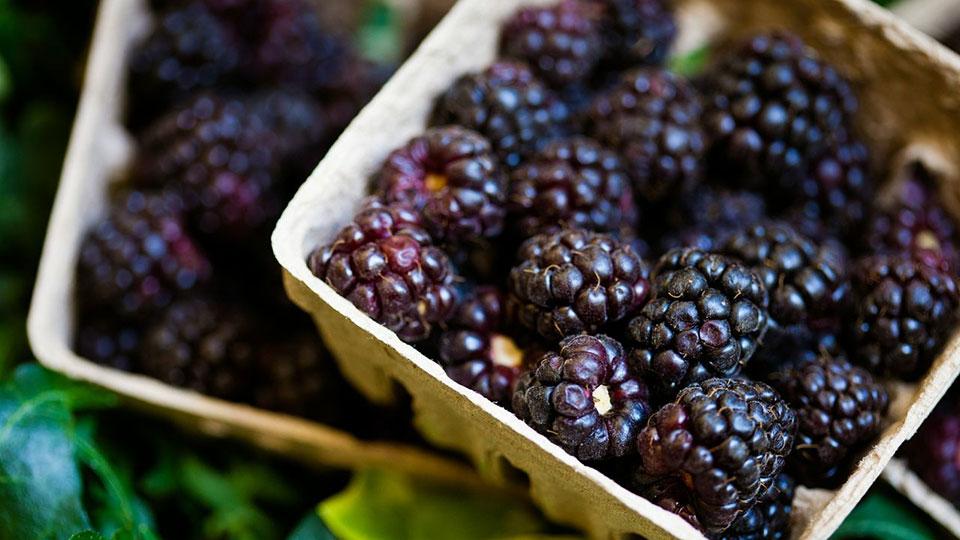In March 2020, global ramifications of the COVID-19 pandemic were in full swing, and businesses, non-profits, and individuals were facing a broad range of challenges. Every day there were new stories about catastrophic damage to social systems and institutions: schools were closed, travel was at a standstill, and supply chains were disrupted in ways that quickly exposed the vulnerability of our existing food system. These events emphasized the importance of a growing movement toward localization, and inspired conversation and creative action as communities came together to support their most vulnerable members. The COVID-19 pandemic has increased the need for this resilience and has challenged many of us to create new systems and strategies.
Debuting in Fall 2019, the Berry Good Food podcast “Growing A Food Movement” has been a forum for discussion about building a more resilient local food system. In June 2020, we pivoted our podcast format and began a series of conversations with local leaders and innovators. This podcast Zoom series “The Bright Side” will highlight stories of growth and innovation as we discuss how we can use these lessons to create momentum toward a healthier future.
Kitchens for Good
With Aviva Paley, Co-Founder and Senior Director
Moderated by Jessica Waite, BGF President
Recorded June 3, 2020
Aviva Paley was 22 when she co-founded Kitchens for Good with Chuck Samuelson. She saw that all across the country organizations were using kitchens as a tool for empowerment and community building. There wasn’t an organization like this in San Diego, and Aviva and Chuck identified a huge need and opportunity. With the help of a broad range of mentors and experts, they launched Kitchens for Good (KFG) in 2014.
KFG helps men and women who want to build careers in the culinary and hospitality industry who have typically been considered unemployable. These students are overcoming histories of homelessness, incarceration, and foster care, and are practicing their culinary skills by preparing healthy and nutritious meals with rescued and surplus food for San Diegans in need.
In the beginning of 2020, Aviva felt that KFG was beginning to turn a corner. No longer a start-up, the organization was working toward bigger-picture projects, expanding into a larger kitchen, and launching apprenticeship programs. When the pandemic hit, the team was forced to switch from long-term thinking to immediate response. Using their abilities as a hunger relief provider, they were faced with the challenge of scaling to meet a huge demand in the community. During the initial months of the COVID-19 pandemic, Kitchens for Good scaled up meal production from 2,000 meals a week in February to 15,000 meals a week in June. The team pivoted to provide production directly out of their kitchen in southeastern San Diego, which is an area with high levels of food insecurity.
According to Aviva, the pandemic has highlighted a broken economic system. Those that were getting by on very thin margins before are now having to make tough decisions of whether to feed their kids or pay their rent. Hard-working and proud individuals that had never needed support services in the past were now finding themselves in a food donation line. While this has been challenging for many, there is much gratitude in the community, as so many groups are stepping up to feed and support their neighbors.
When we spoke in June, KFG was just getting to a place where they could begin planning for the future. Prior to the pandemic, a key part of their model was as a social enterprise. Their robust catering company was handling more than 450 events a year and generated about 50% of their operating budget. Their catering business has essentially vanished, and they do not expect it to come back in the next year. KFG is committed to social enterprise as an opportunity to generate revenue and employ students. They now plan on taking the next year to reevaluate what kind of enterprise should be launched; possibilities include contract meal services or a grab-and-go restaurant concept. For now, the most immediate need in the community is hunger relief as well as supporting students and alumni, as so many have been laid off. Aviva says they will take some time to think about how an enterprise can best serve Kitchens for Good and the community.
One of the most heartwarming stories that Aviva shared was about her team, who have all been working so hard to feed their communities. Many of the apprentices preparing these meals have been cast aside by society because of their experiences with incarceration and homelessness. Having been deemed as unworthy in the past, these individuals are now heroes to those they serve. The KFG staff and apprentices have truly risen up to not just feed their community, but engage in it, by becoming invaluable members of the food system. Their passionate energy was felt countywide and has fueled the successful volunteer program that has, in turn, helped production and efficiency within the meal program. From the positions of New Apprentice all the way up to Director, KFG as a whole has proven that they are hungry to succeed, even when up against insurmountable odds. They represent a leading example for social good and social change that we are humbled to engage with.
Farmer’s Footprint
With David Leon, Co-Founder and Executive Director
Moderated by Jessica Waite, BGF President
Recorded June 11, 2020
Farmer’s Footprint is a young non-profit organization launched in 2019 with the debut of a short documentary called Regeneration, which follows the story of a farm family in Minnesota as they transitioned away from conventional chemical agriculture. Farmer’s Footprint produced a film demonstrating their struggles and transformation as they took back their ability to grow. This birthed an organization that is committed to catalyzing the mass adoption of regenerative agriculture throughout the food system, and regenerative thinking as a mindset. Co-Founder and Executive Director David Leon refers to this as a realignment of the way that we interact with the land, with nature, and with each other.
Farmer’s Footprint works to support the transition from industrial agriculture to regenerative farming. Much of their work is through storytelling and weaving together a supportive network of diverse voices to inspire and facilitate this transition. The process can be as challenging emotionally and socially as it is economically, as a farmer’s identity is often very much wrapped up in how they interact with the land. Co-founded by Dr. Zach Bush, the Farmer’s Footprint message promotes the health and environmental benefits of biodiverse soil, the economic resilience that results from regenerative farming practices, and the community and connection that can be built between farmers and consumers.
There is currently much buzz about regenerative farming, and for good reason. David reminds us that everything in nature is cyclical. When we talk about this in terms of agriculture, we are talking about realigning agriculture with the cycles of nature. Instead of tilling a field down to the earth between cash crops, regenerative farmers allow a diverse range of cover crops to grow in the soil, mirroring what we would see in lands if there weren’t any agriculture there. These cover crops pull carbon out of the atmosphere to be stored in the soil. This is nature’s technology to reverse climate change. In addition to environmental benefits, this kind of farming is good for human health. There is amazing complexity and diversity in the soil, which sends more complexity and nutrients into the plants. By allowing the soil to regenerate we can avoid the need for synthetic nutrients and allow nature to create delicious and nutrient-dense food.
The Farmer’s Footprint team helps us understand why agriculture touches us all, even if we have never stepped foot on a farm. This was never more apparent than during the COVID-19 pandemic when the vulnerabilities of our food system were brought into the light. The lack of resilience in our food systems quickly became obvious as shortages began to occur. Many farmers that supply restaurants were left with wasted surplus. Similarly, there were big issues around processing. If local food systems didn’t have the ability to process meat and grain nearby, or if conditions were unsafe for workers, they were stuck. The solution, as David pointed out, is SMALL FOOD. By making our food systems more regionally specific, shortening supply chains, and building relationships, we can make our communities more resilient.
This insight led us to the question of a silver lining, or “bright side.” David reflected that this is a time of inspiration and great hope. He spoke of the re-emergence of the farmer as a key role in society, as heroes. “Get to know a farmer, acknowledge what they have to teach you about natural systems. You will be healthier, be eating delicious food, and hopefully you will have a new friend… because we all can use a little more connection in these times.”
Coastal Roots Farm
With Javier Guerrero, Executive Director
Moderated by Jessica Waite, BGF President
Recorded June 10, 2020
The mission of Coastal Roots Farm in Encinitas CA is to cultivate healthy communities through food justice, regenerative agriculture, and ancient Jewish wisdom. This committed and passionate team nourishes the community through an organic distribution program, growing 40,000 pounds of organic produce annually and reaching 25,000 people per year. Coastal Roots farmers supply food to the public through a pay-what-you-can farm stand, as well as through direct donations within the community.
When news of the shutdowns came through, the Coastal Roots team pivoted quickly. Closing down the farm stand for just one day, they implemented a new system to distribute produce boxes with their pay-what-you-can model. Community members ordered produce from their cars, and the Coastal Roots farmers assembled their orders. The entire Coastal Roots team joined the farm stand workers to meet demand. Offsite donations continued, which supports clinics, military, and veteran families, as well as home deliveries for seniors, food pantries, and Holocaust survivors.
An important piece of the Coastal Roots mission is education, including farm tours, volunteer opportunities, a high school and college internship program, and events that help build community around the farm. With the onset of COVID-19, the Coastal Roots team had to reimagine their systems and programs to meet an increasing need for healthy food, and to continue to engage and inspire through remote learning platforms. Once the team got their “sea legs,” they started to ramp up virtual programming. They switched to social media and created a virtual farm experience. They assisted schools by developing online curriculum to meet the needs of teachers in the community. A benefit of “going virtual” was the extended reach the team now had, welcoming 2,000 online participants to a program that normally would have hosted 100 people. Coastal Roots is investing in additional connectivity (Wi-Fi) at the farm, so they can take viewers deep into the food forest, and out to where the chickens are grazing. This virtual farm will be available to anyone, allowing them to travel through the farm to learn about soil, compost, and pasture-raised chickens as part of regenerative farming. The innovation that was necessitated by COVID-19 will have long-lasting benefits.
Javier pointed out that much of what children and families need for health and wellness is to get outside. The farm is a completely outdoor experience, and Coastal Roots put together a farm camp (young farmers in training) with reduced camper numbers and additional safety protocols. When they released their registration, they filled up 6 weeks of camps in less than 48 hours.
When asked what he hopes will be a positive take away from the pandemic, Javier mentioned gardening at home and shopping local. The benefits are significant: shopping locally allows us to control who pays for the hidden costs of food while reducing carbon emissions, supporting local workers, and limiting the use of packaging and storage materials. Local food is healthier and tastes better, especially when it is grown regeneratively in healthy soil. Regenerative agriculture is a tenet of the Coastal Roots mission. By casting a wide virtual web the Coastal Roots educational team will be able to share valuable information about the need to restore our soil and evolve away from conventional farming methods, towards a healthier and more sustainable food system. Javier reminds us to avoid harmful chemicals in our food, and to celebrate delicious and healthy farm fresh produce. The Coastal Roots Farm Stand makes this easy to do.





